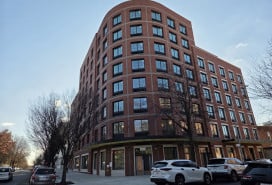Co-ops unmasked: an Upper West Side board member on her worst interview, vetting a neighbor's net worth, and more

Lisa* owned her two-bedroom in a prewar building on the Upper West Side for about 12 years before being asked to join the board. For the last two years she's served as treasurer, one of five people on the board of her 65-unit building.
Her responsibilties include signing the checks, looking over the bills, attending monthly meetings and board interviews, and vetting buyers.
She talked to us recently about what serving on a board is really like, from the challenges of having to raise maintenance fees, the questions buyers should expect during an interview, to the delicate matter of evaluating a neighbor's finances.
What's it like to sit on the other side of a board interview? What do you look for in a buyer?
Because it's such a competitive marketplace, the brokers have vetted the buyers really well before submitting their applications.
Their financials are really, really strong, and they have the proper debt to income ratio. We have certain benchmarks for debt-to-income ratio, as do most buildings (generally buildings are 25-30%). Also, they need to have at least a year's maintenance payments in liquid assets (cash/marketable securities) in reserve after buying the apartment.
By the time people get to the interview stage, all the questions about their finances have been resolved. So it really comes down to seeing if there’s any reasons why you wouldn’t be in the building. We've never turned someone down since I've been on the board, but I think the red flags would have to be general rudeness and unfriendliness.
We're not a Central Park West building that's looking for a certain profile of people to live in our building. We want to know these are people who will be pleasant neighbors.
Describe your worst interview.
We had a sublettor once and all three of us who were there for the interview got a bad feeling about the husband. It was purely a gut feeling and he was just sort of creepy. We let the family sublet anyway, and it turns out there were a lot of issues within the family, a lot of noise, and the police were called in a couple of times for disputes. We didn’t end up renewing the sublet. That was a lesson. We were too nice.
What do you ask buyers?
Why did you choose this building? What do you like about the Upper West Side? Are you planning on doing renovations?
If they are, we explain the process of approval and try to give them as much guidance as possible, telling them that the managing agent and board need to see plans whenever permits are required. People are free to renovate, though. We all realize that apartment renovations can make the building more desirable.
You want people to talk about who they are and what they do. People are prepared, they know it’s New York, and they know the process. They talk about their jobs, where they’ve lived. We’re always looking for people who would be good board members, so if they’ve lived in a co-op we ask if they’ve been on the board and/or would want to be on our board.
You get a lot of personal financial information from your neighbors. How do you feel about that?
We’re not delving into a lot of personal information. But I know exactly what they make, and I’d say I know as much about them financially as they do. It doesn’t feel awkward though.
And I don't feel envious. If I felt envy about people with more money than I did, it would be very difficult to live in NYC. As a board member, we are protecting the collective assets of the owners and are focused on the financial stability of the building. If people with strong financials move into the building it's good for everyone.
Also, people who’ve been in the building for a while recognize that there’s a different level of assets that’s coming into the building these days. The apartments cost about two-and-a-half times what they did when I moved in [14 years ago].
What do you do with the information? Do you ever pass it on?
We never share information with anyone else outside the board, even spouses. There’s total confidentiality, like something between a doctor and patient. We share the information among the board members and then make sure to shred all the documents.
What do you do if people don’t pay their assessment fees?
We have had that happen, sometimes people lose track, or they’re out of the country, etc.. We just have to sort of chase after them. The managing agent does a lot of that. We’ve never had an issue that wasn’t quickly resolved.
What about setting and enforcing the rules? Is that something you do as a board member?
We have played a part in it. There are bylaws and building rules. We haven't amended the bylaws, but we have supplemental building rule policy and that can change sometimes. If something’s new we try to email everyone or put a notice under their doors.
One thing is that there have recently been a few more apartment combinations in the buildings. With the extra space, people want washer/dryers, but our pipes can’t handle them. They weren’t designed for that rush, and although people don’t like that we have to remind them that there's a rule against it.
We also have to make sure that our sublet policy is enforced; we need to keep in mind how many renters we have in the building because we still have some sponsor units and we don't want potential buyers having trouble getting a mortgage because of the owner-to-renter ratio in the building. We reserve the right to say no to sublettors. For example, if someone's been subletting for two years, and is coming into their third year, we're more likely to say no to them in favor of someone who wants to do it for the first time.
Also, we have a bike room in the basement, and we do an inventory every once in a while and tell shareholders that they need to tag their bikes and claim them or the super will give them away to Goodwill. And there’s also a limit to the number of bikes each unit can have. People get pissed off, but that’s the way to run an efficient, clean building.
Who's best suited to join a board?
People who have the building’s best interest in mind. We're not going to put someone who bought their apartment 30 years ago and doesn’t understand finance on the board. We want people who are going to have a long-term commitment to the building and are able to make tough decisions.
What advice do you have for someone who’s thinking about joining?
Find out how much of a time commitment it is. Find out who it is on the board, if it’s people you want to work with, just like taking on any other job. Is it best for you and the building? For me, the time commitment is about four hours a month, and that works for me. But it's much more for the president and some other members of the board.
Why do you think you were asked to join your board?
They wanted someone who was competent and well-liked--a non-divisive person. They don't want anyone too controversial. Plus, I'm an attorney, so that helps. There are other people on the board who are writers and editors, and they are usually secretaries. We like to take advantage of people's strengths.
How has it been so far?
My experience has been very positive. I got on the board after a major capital improvement. The building had just refinanced the mortgage, so we had some money. We were also about to start on our Local Law 11 project [inspection of the safety of the building's exterior] and a window project. I joined at a time when things had just changed for the better. It was interesting, educational and, overall, smooth sailing.
Would you ever want to be president?
No. Treasurer is a pretty innocuous position. The president is the one who gets hit by the complaints. I’m a working mother. I have enough stress in my life.
What sucks about being on a board?
It's never pleasant to raise maintenance, which we've had to do each year, because of taxes and fuel costs increasing. My maintenance, for one, has gone up about 15 percent in the last two years. But we try to explain to the shareholders why we're doing it. We always send out a detailed letter and explain that it's for the financial health of the building. That should be important to everyone, though obviously nobody likes having to pay more each month.
Board Approved: How to impress a NYC co-op board
Here are the 7 most likely reasons you'll get rejected by a co-op board
























